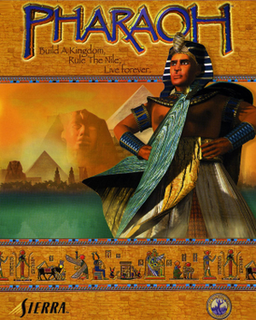Pharaoh (computer game)
| Pharaoh | |
|---|---|
 |
|
| Developer(s) | Impressions Games |
| Publisher(s) | Sierra Entertainment |
| Designer(s) | Chris Beatrice |
| Composer(s) | Keith Zizza, Henry Beckett |
| Series | City Building Series |
| Engine | Isometric projection |
| Platform(s) | Microsoft Windows |
| Release | 1999 |
| Genre(s) | Strategy/Simulation |
| Mode(s) | Single-player |
| Cleopatra: Queen of the Nile | |
|---|---|
 |
|
| Developer(s) | BreakAway Games |
| Publisher(s) | Sierra Entertainment |
| Designer(s) | Chris Beatrice |
| Composer(s) | Keith Zizza |
| Series | City Building Series |
| Engine | Isometric projection |
| Platform(s) | Windows |
| Release | 2000 |
| Genre(s) | City-building game |
| Mode(s) | Single-player |
Pharaoh is an isometric city-building game that was released on October 31, 1999, created by Impressions Games and published by Sierra Entertainment, for Microsoft Windows. Using the same game engine and principles of Caesar III (also by Sierra Entertainment), it is the first such game in Sierra's City Building series to focus on another civilization of ancients times, with players overseeing construction and management of cities and settlements in Ancient Egypt, micro-managing every aspect of the city, while also ensuring its citizens are fed, employed, healthy and protected from diseases, disasters and wars.
The game was complemented with an expansion pack called Cleopatra: Queen of the Nile, developed by BreakAway Games the following year, which extended the game's main campaign into the Hellenistic period. Both the original game and expansion pack are commonly referred to, and may be purchased as one, under the title Pharaoh and Cleopatra.
Pharaoh is played from a two dimensional isometric perspective, with the magnification level fixed but the viewing angle able to be changed, but only at 90 degree angles, either counter-clockwise or clockwise. Much of the control is managed through the mouse and keyboard-shortcuts, with the game using an interface system like Caesar III, with buttons incorporated on it linked to different types of construction the player needs for their city (housing, roads, schools, warehouses, etc.), as well as buttons to view messages, undo mistakes and cycle through trouble-spots, along with a map of the region Ancient Egypt extended into, a group of advisers, called Overseers, that the player can rely on for information on the city's development and any problems encountered, and in-game overlays that can detail any rising issues and if housing is getting what it needs for its current level. All aspects of city life, such as housing, religion, warfare, and trade, are designed carefully to closely reflect that of actual Ancient Egyptian cities of the time, including the goods and services that they had available, with names of various pharaohs used in the game along with the appearance of historical characters from the period of Egypt's ancient history; limited encyclopedic information about ancient Egyptian practices is provided in the game's help menu and instruction booklet. While the game uses the deben as its currency, in reality it is not the case as no standardised pieces of metal have been found to indicate the actual currency of Ancient Egypt. Although the puzzle-like aspect of Pharaoh keeps the simulation far from realistic, the game stays true to the chronological order and timing of major events in the history of Egypt, including monument construction, wars and national disasters, the births and deaths of notable leaders, and the founding and fall of ancient cities.
...
Wikipedia
